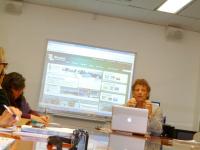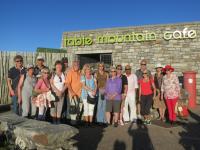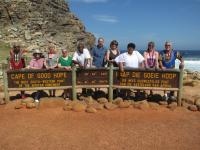For most students, university is about more than academics. It’s also about gaining a broader perspective of the world and building lifelong relationships along the way. However, many people don’t think about online and distance education in the same fashion as the in-person interactions that accompany classroom lectures. Paul Stacey begs to differ.
The former BCcampus director – now with non-profit organization Creative Commons – earned a Master of Education in Adult Learning and Global Change (ALGC) from UBC in 2006. The intense 2-year program, which has been around for the past decade, is offered entirely online through an innovative partnership between UBC and universities in South Africa, Sweden and Australia. Students are placed in cohorts with other learners from all over the world and taught by a rotating roster of educators from each of the participating universities.
“During my time with BCcampus, I constantly made decisions aimed at online and distance learning. When I decided to pursue a graduate degree I knew I wanted those decisions to be based on my own actual, first hand experiences as an online student,” says Stacey. “Working within a cohort with other students from far-off places has helped me to inform many areas of my work, providing me with a better understanding of the impacts of globalization on adult learning.”
20 years ago programs like ALGC wouldn’t have been possible – today, thanks to advances in technology, a learner from British Columbia can work cooperatively with other students on every continent while receiving online classroom instruction from educators located thousands of miles (and multiple time zones) away.
“We’ve always had to be conscious about the technical difficulties often faced by students in other countries, such as South Africa, where until recently, most people only had the use of dial-up modems,” says Dr. Garnet Grosjean, ALGC International Program Coordinator. “Given that the vast majority of our students work full-time, we contacted South African employers to request that students be allowed to transmit their school projects from the workplace where high speed connections were plentiful. Now that high-speed internet is commonplace in South Africa, our students there are no longer at a disadvantage.”
One of ALGC’s most unique features is the bi-annual ‘ALGC Institute’ –face to face meetings for graduates hosted by partner universities in each of the four nations. Institutes create an excellent opportunity for networking, offering students and instructors the chance to finally meet in person and visit in-country adult learning sites.
“At the 2012 Institute in Cape Town, South Africa I noted four students from the 2002 cohort who have attended every Institute held since then,” says Dr. Grosjean. “In fact, Paul Stacey has attended Institutes in Canada, Sweden, Australia, and South Africa. Clearly, he’s made some significant connections on a global level.”
“While I was planning to attend the Institute in Sweden, I contacted a fellow student from my cohort and made arrangements for my wife and I to stay with her there. Another South African member of my cohort has travelled to visit with us in Vancouver,” says Stacey. “This adventure in global learning has broadened my perspective on the relationship between adult education and global change while also allowing me to forge longstanding friendships – impactful experiences both made possible by the gift of online and distance learning.”
For more information about the ALGC program, contact Dr. Garnet Grosjean.
Posted by BCcampus Editorial Staff



